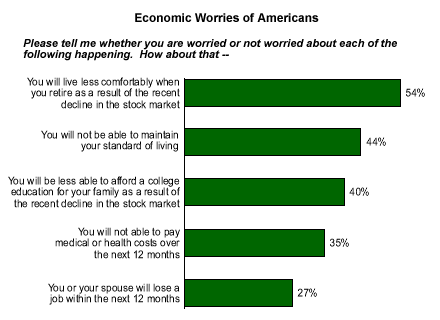The second most important sales period of the year -- "back-to-school" -- was not good for the nation's retailers. Retail figures plunged 1.2% in September as auto sales fell sharply. This leaves the retail business in dire need of a good holiday season to salvage the year. Unfortunately, there is not much reason for holiday optimism given the current public mood.
Consumer Confidence Is Breaking
Consumer confidence fell to its lowest level since January 1996 according to an ABC/Money survey completed Oct. 6. Consumer sentiment dropped for the fifth month in a row in early October according to the University of Michigan's preliminary consumer sentiment report. Although both of these surveys are based on a relatively small number of October interviews, their findings are consistent with Gallup's current economic polling data.
According to the latest Gallup Poll conducted Oct. 3-6*, consumer confidence has reached a very low level:
- The percentage of Americans rating current economic conditions "poor" (27%) in early October equals the percentage rating them as "good" or "excellent" (26%). Current consumer evaluations of the economy are consistent with their 1994 levels.
- Six in 10 Americans (59%) say economic conditions are getting worse, not better.
- More than half of the public (55%) says the economy is now in recession.
Consumers Are Worried
Six in 10 Americans say they still have money invested in the stock market right now, so it is not surprising that more than half say they are worried that they will live less comfortably when they retire as a result of the decline in the stock market. Similarly, 40% of Americans say they will be less able to afford a college education for family members as a result of the recent decline in the stock market.
Still, more reflective of the immediate concerns of the average American consumer is the finding that 44% of Americans are worried they will not be able to maintain their standard of living. This may reflect concerns about "underemployment" -- an impact of economic slowdowns that often does not receive enough attention. In this same vein, 35% of consumers say they are worried that they will not be able to pay medical or health costs over the next 12 months. Probably the biggest reason for concern, however, is the fact that more than one in four Americans say they are worried that they or their spouses will lose their jobs in the next 12 months.

Key Points
Overall, I think the current economic situation is much like it was in August of 2001. At that time, there was a great deal of uncertainty and debate over whether the economy was experiencing a recession. The impact of the September terrorist attacks left no room for argument -- there was an immediate consensus that the economy had entered a recession.
My guess is that many of the nation's policy-makers are going to experience a similar economic epiphany following the congressional elections. Suddenly, the dangers of a double-dip recession will gain status equal to that of the potential war with Iraq. According to recent polls, the economy is already as important as Iraq as far as the congressional elections are concerned: About one in four Americans (24%) tell Gallup that the most important issue to them when they think about voting for Congress this year is the possibility of war with Iraq. Virtually the same number (25%) say that the issue they think about most is the economy.
Unfortunately, even if the Fed decides to cut rates after the elections and Congress passes emergency economic legislation upon its return, such efforts are unlikely to help save this year's holiday season. In this regard, it is a real pity that Congress didn't consider another immediate tax rebate for November or even December. It is also a pity that the only real choice for most retailers at this point is to plan on a less robust holiday season this year than last.
*Results are based on telephone interviews with 1,502 adults, aged 18 and older, conducted Oct. 3-6, 2002. For results based on the total sample, one can say with 95% confidence that the maximum margin of sampling error is ±3%.

